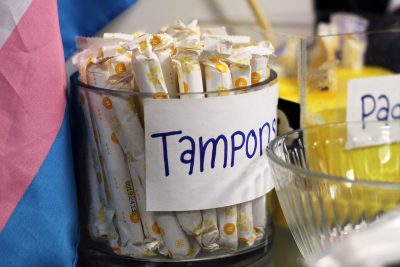
The baskets of free menstrual products provided by the Center for Gender, Sexuality and Activism (CGSA) since early October in certain George Sherman Union and Mugar Memorial Library bathrooms are now left empty, as the Dean of Students Office (DOS) has denied CGSA appeals for funding to continue the service.
A notice was left on the baskets in GSU first-floor and basement bathrooms and the first-floor gender neutral bathroom in Mugar Library, explaining that due to a lack of sufficient long-term funding of the CGSA for the service and the refusal of the DOS to provide funds for the temporary program, the products are no longer being provided.
“As the Dean of Students (DOS) plans to spend the next year figuring out a way to give out free menstrual products, the CGSA voluntarily provided these as an interim services,” the notice said. “As of October 25th, DOS has denied our appeals to provide supporting funds for the items we’re giving out, so we can no longer provide this service.”
The CGSA’s goal was to provide these products only until the DOS found a way to fund and implement a campuswide version of the service, said CGSA External Coordinator Lindsay Child, a senior in the Wheelock School of Education and Human Development.
This effort in the interim period was initially funded by the club’s revenue fund, said CGSA Health and Education Coordinator Sam Wu.
The fund was mostly composed of allocations from the Student Activities Office, Child said, as well as other money fundraised by the club.
While the menstrual products were being provided, Wu said members of the club would purchase them from local drugstores and were reimbursed by the revenue fund.
Wu said their preliminary goal was not only to provide the service, but to determine the annual cost.
“Our goal was to figure out how much it would cost, but because of a lack of funding, we were unable to continue with it,” Wu said. “Obviously if the university were to take it head on, it would only be a fraction of their budget, but because we were primarily funding it out of our revenue fund, it just wasn’t feasible.”
Although this was a temporary effort to provide menstrual products, Child said students still need them while the university looks into a long-term solution.
“Since there is still an ongoing need for menstrual products, and basically no campus bathrooms have even the paid dispensers right now, there basically aren’t options for people who need pads and tampons right away,” Child said. “In the interim there is still a need.”
The CGSA has called for students who wish to see the project continued to contact the Dean of Students office or reach out to the CGSA with questions. CGSA Internal Coordinator Brian Stanley confirmed that no students have reached out in response as of press time, although the CGSA has previously received emails when the baskets were emptied, before their funding ran out.
BU spokesperson Colin Riley said the CGSA began the program without sufficient funding to sustain the project.
“It’s not the money, it’s about doing things across campus in a consistent way,” Riley said. “I’m not addressing the CGSA, they are welcome to spend their money as they choose, depending on if they are in line with the procedures of the Student Activities Office in regards to spending.”
Wu said their estimate of the annual cost for this service would only be a small amount in comparison to the available administration funds.
The CGSA distributed 681 tampons and 230 pads between Oct. 12 and Nov. 1, Wu said, leading to an estimated cost of $2,800 per school year to supply the aforementioned GSU and Mugar Library bathrooms with menstrual products.
“This amount is only a fraction of one student’s annual tuition,” Wu said, “and suggests that BU could easily provide free menstrual products in the GSU bathrooms.”
Aqsa Momin, a junior in the College of Arts and Sciences, said she thinks providing these products should be a focus of the administration, especially for college students.
“You shouldn’t have to be punished for being a woman and having your period,” Momin said. “Dealing with that on top of trying to find food for yourself and every other thing that comes with basic living necessities is hard. If they can provide funding for groups on campus to compete and go places and stuff like that, they should definitely be able to provide a basic necessity for women.”
Ibrahim Chand, a freshman in the College of Engineering, said he does not know the potential cost of providing free menstrual products but thinks BU should be able to meet this need.
“I don’t know too much about how much it would cost to provide them,” Chand said. “Obviously BU has a very large population, but whether or not money should be allocated, with the rate of our tuition, I don’t see why not. It just seems like a basic product that should be provided.”
Riley said that products are hard to supply in this manner because they are taken at an unsustainable rate and disappear quickly, an issue the university is currently considering.
“So if a BU student is in need of one and they end up in a restroom and they are not available, yet they were refilled the day before, it doesn’t make sense,” Riley said.
CAS freshman Katherine Barahona said she is curious about where the funding for the long-term project would come from.
“Personally, I think most girls would be biased because it’s something that’s helpful for us,” Barahona said. “But I would like to know if it did go through in the short term, would it affect any other service that they are providing for us. I feel like if [DOS staff] isn’t willing to give up this small amount of money, then it may be because they are trying to cut down on other services to bring the long-term one.”


















































































































